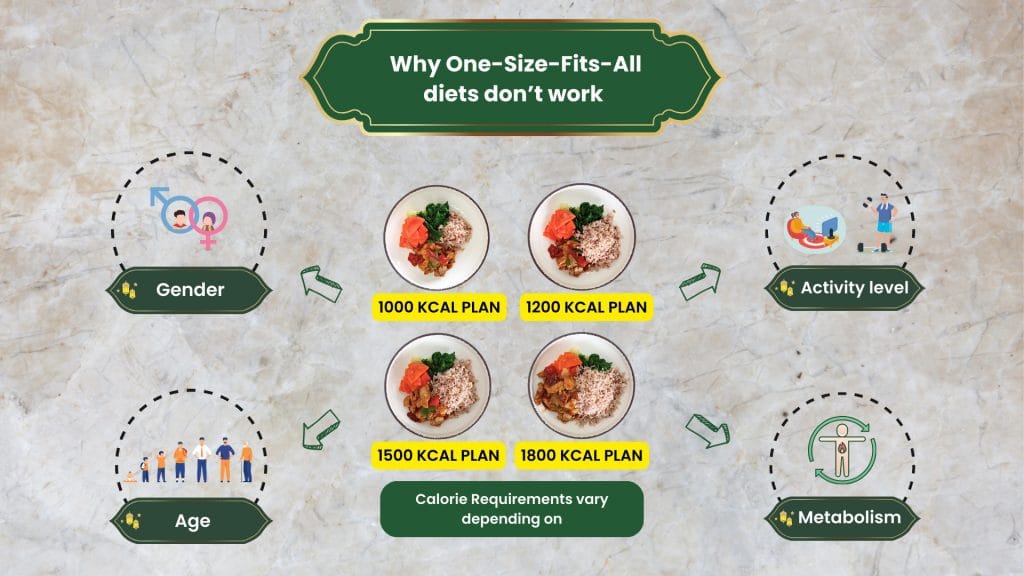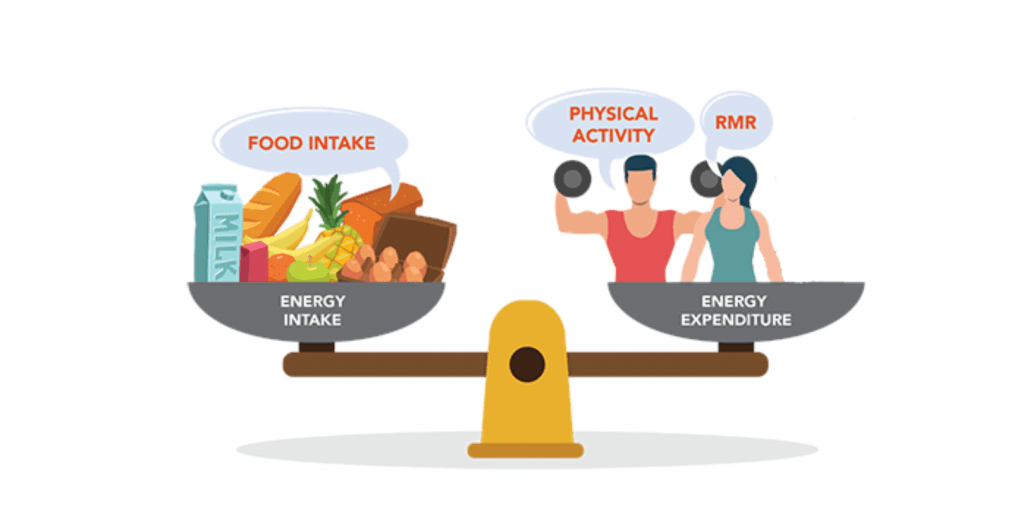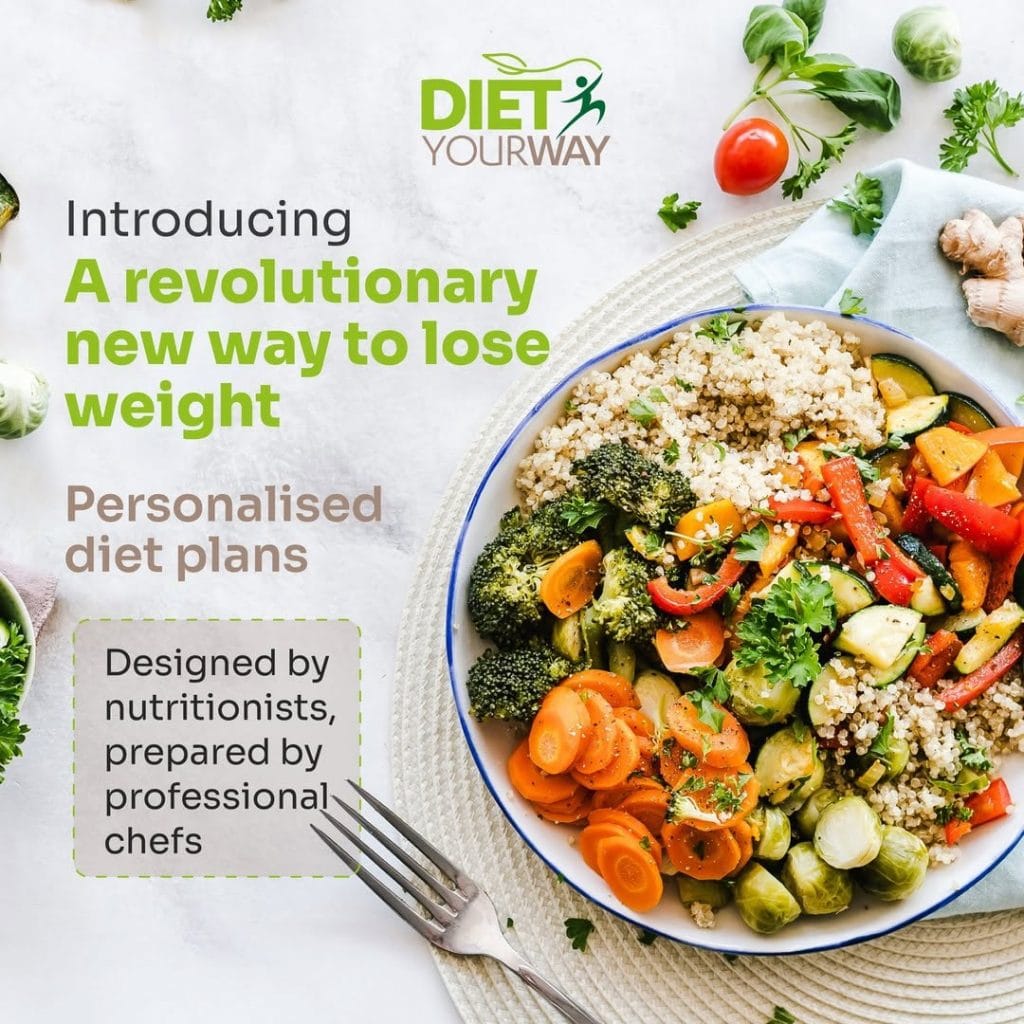
When it comes to weight loss, a common misconception is that there’s a universal calorie intake that works for everyone. In reality, each person’s needs are unique, and a one-size-fits-all approach often leads to frustration and limited results.
Why One-Size-Fits-All Approach Doesn’t Work

Calorie requirements vary widely based on several factors, including:
- Age – Metabolism slows with age, affecting energy expenditure.
- Gender – Men generally have higher muscle mass, leading to greater calorie needs.
- Activity Level – A sedentary person burns fewer calories than someone who exercises regularly.
- Metabolism – Some people naturally burn more calories at rest due to genetic and lifestyle factors.
This means that two people following the same calorie-restricted diet can experience entirely different results. What works for one person may not be effective for another, making a personalized approach crucial.
How to Determine the Right Calorie Intake
 Finding the right calorie intake for weight loss starts with understanding your body’s energy needs. Two key calculations can help:
Finding the right calorie intake for weight loss starts with understanding your body’s energy needs. Two key calculations can help:
- Basal Metabolic Rate (BMR) – The number of calories your body needs at rest to maintain basic functions such as breathing, heart rate, digestion.
- Total Daily Energy Expenditure (TDEE) – The total calories burned daily, including from physical activity and exercise.
By using BMR and TDEE calculators, you can determine a suitable calorie intake that aligns with your weight loss goals. Generally, creating a calorie deficit (consuming fewer calories than you burn) is the key to losing weight, but the amount of deficit needed varies from person to person. Typically, a daily caloric deficit of around 500-1000 kcal can lead to a steady, healthy weight loss of approximately 0.5-1 kg per week, which is both safe and sustainable.
Adjusting Your Intake for Success
Tracking your progress is essential for effective and sustainable weight loss. If your weight loss has stalled for weeks despite consistent efforts, your body may have adapted to your current calorie intake. Adjustments may be needed:
- Plateauing? Reducing calorie intake slightly (by 100-200 kcal) or increasing physical activity can help restart progress without causing excessive hunger. Adding strength training or cardio can boost metabolism and help burn more calories.
- Feeling fatigued? Ensure you’re not cutting too many calories too quickly. Make sure to stay hydrated and get enough sleep, as lack of them can impact metabolism and energy levels, making weight loss harder.
- Not seeing results? Reevaluate portion sizes and food choices.
- Even healthy foods can contribute to excess calories if portions are too large. Using a food scale or tracking app can help.
- Aim for balanced meals which includes lean protein, vegetables, fruits and carbs to regulate appetite and improve satiety
- Check for hidden calories – Sauces, dressings, sugary drinks, and snacks can add up quickly without you realizing.
Real-Life Example
Two individuals on a 1,500-calorie diet can have very different outcomes:
- Ali (highly active, and also with fast metabolism) may still maintain weight.
- Nurul (sedentary, and also with slower metabolism) may lose weight steadily.
Despite consuming the same number of calories, their bodies respond differently due to their unique metabolic rates and activity levels. Factors such as daily food intake, hormonal changes, and lack of sleep can also cause weight fluctuations. This demonstrates why individualized calorie intake is essential for sustainable weight loss. Therefore, Ali may need a high-protein, high-energy meal plan, while Nurul may benefit from a more controlled calorie intake with balanced macronutrients.
How Diet Your Way Can Help

Diet Your Way serves up delicious, calorie-controlled meals made to match your individual calorie needs—so you can lose weight without giving up the foods you love. Each meal is crafted to be nutrient-dense, satisfying, and tailored to your ideal calorie intake, making it easy to stay on track without counting or guessing. Whether you’re aiming to slim down, gain muscle or maintain a healthier lifestyle, Diet Your Way delivers real food, real flavors, and real results—straight to your door.

💡 Exclusive Offer: As Raya approaches, BookDoc and Diet Your Way wish you Selamat Hari Raya! Enjoy 22% off your first order with promo code ‘Bookdoc22’. Plus, get up to 15% off on subsequent orders through the BookDoc app’s Activ Rewards. Don’t miss out—order now!
References:
- National Academies of Sciences, Engineering, and Medicine. (2023). Dietary reference intakes for energy: Factors affecting energy expenditure and requirements. National Academies Press. https://www.ncbi.nlm.nih.gov/books/NBK591031/
- Sarwan, G., Daley, S. F., & Rehman, A. (2024). Management of weight loss plateau. In StatPearls. StatPearls Publishing. https://www.ncbi.nlm.nih.gov/books/NBK576400/













